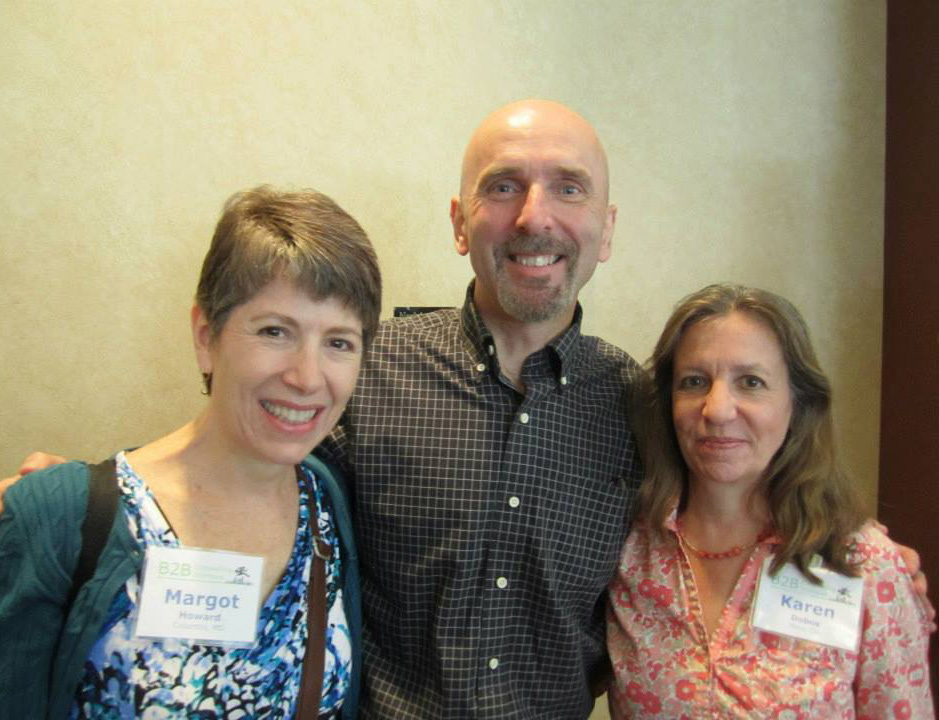“It takes hard work and determination to set up any kind of business. And a freelance writing business is no different … But in fact, it’s doable and it’s worth it. Because there’s nothing better than having a thriving freelance copywriting business with a nice base of clients that you love working with. Nothing on this earth that’s better than that. And it’s worth the effort to make that happen.” – Steve Slaunwhite

One five-minute conversation with Master Business-to-Business Copywriter Steve Slaunwhite and you’ll be clamoring to throw your pen into the world of freelance writing. Far from evangelical in nature, it’s Steve’s calm and insightful demeanor that regularly motivates hundreds of hopefuls to successfully launch writing careers.
Steve’s own career certainly invites inspiration. He’s written and consulted for over a hundred Fortune 500 companies, including Forbes, Sprint, and Hewlett-Packard. His four published books on Amazon bring consistent five-star reviews. He’s won prestigious awards like the Promo Marketing Gold Award, frequently appears as a speaker for large events, and co-founded International Freelancer’s Day.
But at the end of the day, Steve is just another writer doing what he loves (and doing it extremely well). I spoke to him on a Thursday afternoon from his home office in Toronto. Enjoy his insights on self-marketing, copywriting, and small-business success. And pay close attention to his simple, three-step plan for landing clients — it’s something you can start doing today.
***
What started you on the freelance writing path?
Very early on, almost the day I left college, I had a burning desire, not necessarily to be a writer, but to be self-employed. I wanted to be self-employed in the worst way. And this was during a time when being self-employed was not that common. It was considered a bit strange.
I wanted to work from home, to do some sort of consulting or something, I wasn’t really clear what. But I had no idea how to do it. So I started a career in sales. And in fact, I was in sales, B2B sales, for nearly 10 years. And I was doing okay, but I did not like being an employee. I didn’t like having a boss, I didn’t like having to show up somewhere on someone else’s schedule, that kind of thing.
But I didn’t know how to be self-employed. And then one day, the marketing department came into a sales meeting and they said, “Hey, good news, we’re developing some new brochures and we’ll have them to you in a month or so.” And all of us salespeople just recoiled, because the last batch of brochures were just awful. We were embarrassed to show them to the clients. In fact, when I showed those brochures to clients I actually edited the text myself with a pen, saying, “Forget about this, this is what this really means.”
So I went to my boss, and I said, “Can I take a stab at writing the brochure?” And he said sure. And I did, and some of that copy, not all of it, ended up in the brochures. And that was my first taste of writing marketing copy. I didn’t know I could make a living at it, but it was my first taste of it.
That’s a unique angle. Most of our readers start out wanting to be writers and then learn it’s possible to be successful through self-employment.
I should correct that. I always did want to be a writer. That was a dream. I just didn’t think it was a practical dream. In high school, for example, I wrote a play that won an award, and also wrote half of a novel, or a third of a novel or something. So I did always dream of being a writer. But I thought it was in the same category as dreaming you’re going to be an astronaut or a movie star. I just didn’t think it was something I could do. It wasn’t until I discovered copywriting that it brought it all down to earth, and I thought, “Wait a minute, I can do this! I can fulfill my dream of being a writer, I can make money at it, and I can also leverage my background in sales.” It just made the perfect storm.
So was it that background in sales that led you to B2B?
Sort of. B2B was a happy accident for me. I was in B2B sales, so that’s what I knew. And what I teach other copywriters just starting out is to leverage what you know, leverage your background, leverage your industry experience. And I had this experience in selling industrial products and software and things of that nature, so I thought, “Okay, I’ll start there and I’ll focus in on those companies.” And they did happen to be B2B companies.
Frankly, I’m not in love with B2B. If I had a background in fitness, I might be writing copy for fitness centers and personal trainers. I just wanted to be a writer. I wanted to be self-employed. But it just worked out that my background was in B2B sales, so therefore it made sense for me to focus on B2B companies.
I say it was a happy accident because I found that I really enjoyed writing for B2B companies. I really liked the variety, all the different types of projects you get to work on. It’s not just sales writing, it’s also web content and — not back then, but now, social media. Customer success stories, little booklets, all kinds of things you get to write, which I found very interesting because I like variety. And I like the writing style. It’s not too hyped up. The B2B copywriting style tends to be more fact-filled and informative, rather than hyped-up and sales-y, and I like that.
Some writers worry that B2B is a dry topic. What do you say to that?
I hear some objections from some people, especially in Business-to-Business copywriting, that think it’s too dry or too technical. First of all, when you’re a B2B copywriter, you’re not a technical writer. That’s a whole different thing altogether. You’re not writing about the technical components of software or of a forklift truck or something like that. You’re writing about features and benefits. You’re a copywriter, you’re writing about the marketing stuff. So you don’t need to have a lot of technical knowledge to write about the features and benefits of a technical product. You just have to learn what it does and how it benefits the customer, right? So it’s not as technical as some people think. Plus, there’s a lot of B2B companies that aren’t technical. I write for a couple of sales training tracts. They’re B2B, they’re not technical. It’s pretty easy to understand what they do, they train sales people. I write about that. So it’s far from being boring or dry or technical. It’s actually very fun and interesting.
What’s the most effective approach that you’ve found for landing B2B clients?
Well, first and foremost, you need a website that describes and promotes your copywriting services. That’s essential. By some surveys, two-thirds of B2B buyers looking at vendors, copywriters, designers, people like that, will check out that person’s website before they call or email to discuss a project. So you have to have a website. You’re really not in business until you do. And also, what is the first portfolio sample that a client will read when they’re checking you out? The first portfolio sample that they’ll read is your website. Your website is your portfolio, a sample of your writing. So you need to make sure your website is very well written, because it needs to showcase your great copywriting. In fact, some clients will actually be willing to hire you based on how well you’ve written your own website. That’s sometimes enough to sell them. They go, “Hey, this person’s a good writer. I’ve read a couple of pages on his website, I like his writing, I need to talk to this guy about writing for us.”
So launching a professional website is an important first step.
Yes. Now as far as reaching out to potential clients, I find the best way is to pick a particular industry or niche market within B2B, and there are hundreds, really. Let’s say you have a transportation background. You just Google transportation companies and you can come up with a list very easily. And if you do a little research, you can find all kinds of ways to reach out to that marketplace. You’ll probably have no trouble finding the names of marketing managers of transportation companies. Maybe there’s a transportation business magazine that you could find out about, and there might be a way to reach your target audience that way.
So pick a niche or target market and keep it simple for yourself. That doesn’t mean you’re married to that niche forever, it just means you’re focusing your efforts on a particular industry or niche so you can start getting clients quicker. Things essentially happen faster.
A big fear for new writers is that they’ll pick the wrong niche and get stuck there. So it’s nice to hear you say you don’t have to stay in the first niche you try.
It’s not a marriage. You’re dating a niche. See if it pans out for you. And it is a tough decision, but it’s not a lifelong decision. You can focus on the transportation industry for a few months, work with a couple of clients, decide if you like it, see what’s happening. Then you can expand or switch to another niche. You don’t have to declare to the world what your niche is and brand yourself that way right away. You can look at different niche markets, but focus your marketing efforts on one niche at a time. If you try to throw a big net, you won’t get anywhere.
It also decreases your competition.
The Internet makes everybody a competitor. So if you’re trying to do copywriting for everybody, you’re going to have a lot of competitors, probably thousands of competitors. But if you’re the copywriter who writes for transportation companies, how many competitors do you have? You can probably count them on the fingers of two hands.
Exactly.
Yes, it makes things easier. And I find that when I started out, what I did is I wrote a direct-mail letter, just a one or two-page letter, introducing myself and my copywriting service, and I sent it out to a list of companies that I thought might be interested in my services. And I sent it out to the marketing managers of those companies. And that worked really well. In fact, the first client I got actually phoned me, and the company’s name was Triangle Marketing Group, a guy named Mort, he’s since retired. He called me and said, “Steve, I got your letter, I want to hire you to write us a sales letter just like the one you sent us.”
Ah! So you’re saying to just start with those three steps: build your website, pick a niche to start out with, and send out a sales letter.
My letter was a de facto portfolio sample. So sending out a direct-mail letter can still work these days. You can also do it with email. Don’t spam anybody, but there are ways to use email to contact and introduce yourself and your services to a client. I also find speaking works well. Just put together a short talk or presentation on copywriting, and offer to deliver it to the local Chamber of Commerce or industry groups. This is all part of giving prospects a taste of your expertise.
It gets the ball rolling and then it can really take off from there.
Yeah, you’re absolutely right. So there are many other ways you can promote your business, but I find those ways work best for me.
Once you’ve done that — made a website and landed a project — what’s your process from start to completion?
I’m a big believer in keeping it simple, so I don’t have any complicated processes or anything mapped out on Excel or anything like that. What I usually do is I start off with a project discussion with the client. So I’ll ask for a phone appointment, and I’ll stay a half an hour to an hour on the phone asking them questions about the project.
For example, let’s say a client wants to send a series of emails to promote their new training program. I’ll ask them about the training program, details, I’ll try to flesh out the features and benefits. I’ll ask him to sell it to me, I’ll say if I’m a prospect, can you sell it to me? What would you say to me? I’ll ask him a lot of these questions to get information and ammunition I can use in their email. And then once I feel comfortable that I understand how to sell this person’s training program and things of that nature, then the next step is to write a good draft of the copy. I never send an outline, I don’t believe in outlines. I write the copy.
And the next thing the client sees from me is copy in as complete a format as I can possibly get it. That doesn’t mean there will be no revisions, but I let the client know this is the best I can write it. You’re getting finished, polished copy delivered to you. And then if the client wants changes or revisions, I will handle those for the client at no extra cost. In fact, for clients, what I say is that I will rewrite it until you’re happy. A lot of copywriters don’t do that. They put a limit on the number of revisions. I don’t do that. I rewrite it until you’re happy. So that’s my three-step process. Meet with the client over the phone, write the piece, and then handle the revisions.
Seems like a big benefit to not feel limited to two drafts. Am I right in guessing it usually doesn’t take you more than two or three drafts?
Well, I sound like I’m bragging, but at least half the time, if not two-thirds of the time, when I send out my first draft to the client, it’s the only draft. They don’t ask for any changes, they take it as-is.
That’s ideal.
The other third of the time, they’ll ask for some minor revisions. It usually is pretty minor. Every so often, I’ll come up with a client who just doesn’t like the writing and doesn’t like the direction and says I’m doing it all wrong, and things of that nature. At this point in my career, I’m realizing that that type of client is just not a good match for me. He honestly doesn’t like my writing style, he doesn’t like my expertise and point of view when it comes to writing copy, so he needs to work with someone else. But that’s pretty rare.
That’s a great attitude, being that writers often take negative feedback as a commentary on their total writing effort, as opposed to just seeing it as a bad match.
I look at it as a bad match. Though I’m just as sensitive as anybody else. If someone doesn’t like my writing, I still take it personally. I still want to go sulk in the corner. But what it comes down to is we’re just not a good match. I can’t make any big changes in how I write to suit a client. And I usually get very good feedback from clients. I actually had a client cry on the phone because he was so happy with something I wrote for him — he actually started to cry.
No kidding?
That’s a true story. It was a CEO of a company, it was a guy. But I had a client I worked with many, many years ago who didn’t like my writing and was very upset. So when you’re in this business long enough, you get both ends of the spectrum. But it’s all about finding clients who are a good match for you.
When you’re not writing, how do you unwind?
I go outside. That’s what I need to do. As a writer, no matter how successful you are, you spend most of your time in a room alone. So I get away. Any opportunity I have to take a break or whatever, I get outside and I either go for a walk, or I go cycling. Sometimes I go on two-day cycling trips. I also go jogging, skiing, the moving-forward sports. Anything that gets me outside and moving forward. I’m thinking of looking into kayaking this year. Just getting out is very relaxing to me and it really reenergizes me.
And it’s so important for good writing, to not only step away but to get exercise and get your blood pumping hard.
I also try to mix it up. This is not really unwinding, this is a kind of a work-life balance tip. But I don’t do all my writing in my home office. Sometimes I’ll grab my laptop and just switch venues. Sometimes I go to the kitchen table and write there, or to a café. We have a coffee chain called Second Cup up here.
It’s like a Starbucks. I often refer to them as my second office. They know me so well, when I walk in they say, “Hello, Steve.” So I’ll go sometimes and do a couple of hours’ work at Second Cup, a nice café. Just switching venues reenergizes me, especially when I have a lot to do.
Fun question now. If you were shipwrecked on a deserted island and all of your human needs like food and water were taken care of, what two items would you want to have with you?
Do I have a Wi-Fi connection?
Nope.
I would bring a lot of paper and pencils so I could write and think and put it on paper. And maybe an encyclopedia. An interesting thing to read.
I haven’t seen one of those in years.
I’d have to go to an old bookstore to get it.
Exactly, dust if off. Now let’s talk about your published books — you’ve got four of them. Every one of them has extremely high ratings on Amazon. Can you tell us how you found time to write books while managing client work?
I just looked at it as another writing project that I had to schedule in. I had writing clients and then I also had this book, so I had to fit it in my schedule. It wasn’t easy. There were times when I was writing the books, especially the last couple, where I had to work extra hours. I had a lot of writing clients at the same time I had to get the book done.
But the thing about writing a book is that I’m really passionate about writing books. If I could find a way to do that for a living and do nothing else, I’d probably do that. Because when you’re fuelled by passion, you can do just about anything. So a book is really not that daunting if you’re fueled by passion. You’ll stay up late, you’ll get up early, you’ll work weekends because you love it, because you’re fueled by passion. If you’re training for a marathon, as hard as that is, if it’s what you’re passionate about, you make time for training. You do the training because you want to run the marathon. Because that’s part of the experience, right? No matter how hard it is. That’s how I made time for the books, I just wanted to write the books so badly. Make it happen.
Other than your own books, what do you recommend as good reads for someone interested in writing for the B2B industry?
Bob Bly has a good book called The Lead Generation Handbook. It’s a bit dated and some things have changed, but the underlying principles are valid. It’s just packed with tips. I still go to that book for ideas when I’m dealing with clients. Another book is a new book by Gordon Graham called White Papers for Dummies. It just came out a couple of months ago and it’s fantastic. Gordon Graham knows everything there is to know about writing white papers.
How has being a published author affected your freelancing business?
My first book was Start and Run a Copywriting Business. It was published by a small press called Self-Counsel Press, and I published it in 2000. And I just did it because I had this burning desire to publish a book. I mean, everybody wants to publish a book. But when it came out, it pretty much made my career as a copywriter. Clients would see this book with the word “copywriting” in the title and my name on it, and they would just assume I’m an expert on copywriting. And that helped me stand out from the crowd of other copywriters that didn’t have books on the subject. Having a book gives you an unfair advantage, you know. If you’re choosing between two consultants, and one consultant has a book in his field and the other consultant doesn’t, the tendency is to pick the consultant who’s written a book on the subject. So I would recommend to anybody building a career in freelance writing in any area, not just B2B, if you can get a book, even a self-published Kindle book out, it’s going to help your career. No doubt about it.
Plus, it’s something tangible that a client can touch and hold, as opposed to all the electronic correspondence we always see.
A client hired me a couple of weeks ago to do some copywriting training. And she wanted me to send her a proposal. I talked to her on the phone, I sent her my book. She showed my book around to her marketing team and then she emailed me back. She said forget about the proposal, your book was enough to sell it. I got a buy-in from everybody, come in and do the training. So books are very powerful.
Nice tip. Thank you for that.
I probably buy more copies of my own book than have been sold, because I use them so often.
Last question. What is the number one thing you would say a new writer should not do when preparing to launch their freelance writing business?
It takes hard work and determination to set up any kind of business. And a freelance writing business is no different. I mean, you’re going to have to learn your craft, you’re going to have to learn to write what you write. You have to become good at editing. You have to work hard at getting those first few clients. But in fact, it’s doable and it’s worth it. Because there’s nothing better than having a thriving freelance copywriting business with a nice base of clients that you love working with. Nothing on this earth that’s better than that. And it’s worth the effort to make that happen. I know a lot of copywriters that try for a month, then they give up. They go, “How come I’m not getting any clients?” and, “This is harder than I thought it was going to be!” Of course it is. But it’s worth it. So if you just accept the fact that it’s going to take some hard work at the beginning to get it off the ground, but it is doable and you can do it, then you’re going to be in pretty good shape.






